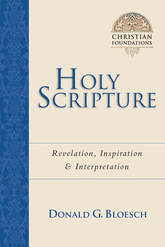
Bloesch's third approach protects the Scripture from issues like inerrancy and infallibility. These terms, Bloesch determines, are too rationalistic. Rather, her refers to the Bible's reliability as an "abiding truthfulness and normativeness of the Biblical witness" (27). It is not a property of human witness but a witness of the Spirit. A final quote wraps us Bloesch's thought: " God's Word is absolute, but it comes to us in the form of the relative. Through the power of the Spirit we are nevertheless placed in a relationship with the absolute, and this means that our thoughts and activities have a sure anchor in eternity. We do not ascent to the absolute unfaith, but the absolute descends to our level" (28).
I believe that Bloesch's three approaches correctly summarize the main way people come to Scripture. Bloesch is trying to present a middle way between the two extremes. I appreciate his desire to make the Bible neither a "paper pope" or subjugate the authority of Scripture to mere human understanding.
There is one area that I find problematic (and perhaps he will address this later in the book). Bloesch essential states that Scripture is owned by the Spirit. The challenge is that even the concept of the Spirit is misconstrued by both the evangelical rationalists and the religioethical experimentalists. The first throttles the Spirit and the second misuses the Spirit often to justify their own agenda. If the Spirit is the center of the nut, per se, it will be difficult for either group to be persuaded.
Despite this challenge, I believe Bloesch provides a unique and helpful approach to understanding what is at stake with the interpretation and application of Scripture.
So far, so good!
 RSS Feed
RSS Feed